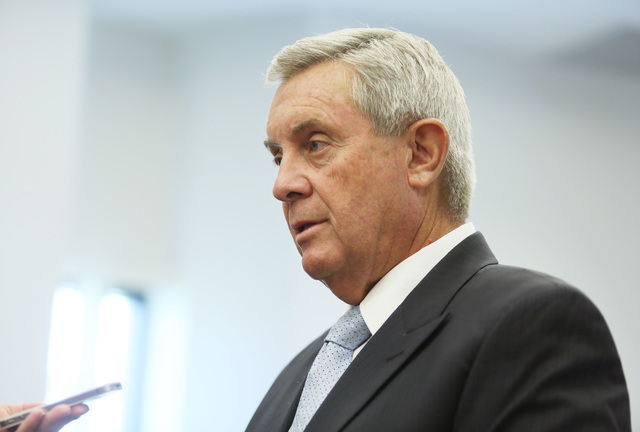Campaign calls for Nevada appellate court
Supreme Court Justice James Hardesty, who on Tuesday helped launch a campaign to create a state appeals court, said justice for thousands of Nevadans is being delayed and denied because the high court is so overloaded with cases that it can take years to resolve them.
Hardesty said that’s why the state needs a Court of Appeals, which would handle cases ranging from child custody and child support disputes to prisoner complaints about inadequate food and clothing.
Now, the Supreme Court deals with every appeal from district courts because Nevada is one of only 10 states without an intermediate appeals court. The proposed Nevada Appeals Court, however, wouldn’t operate as another level of government with its own separate facilities and administration as in most other states, said proponents.
Instead, the appeals court would take cases the high court designates to ease the burden on the busiest state Supreme Court in the country.
The appeals court would operate out of the high court’s building in Carson City and out of the Justice Center in Las Vegas in existing office space.
Voters will decide in the Nov. 4 general election whether to approve the Court of Appeals, which will appear as Question No. 1 on the ballot. The Nevada Legislature unanimously approved it in 2011 and in 2013.
“I truly hope that the voters will give it serious consideration this year,” Hardesty said at a meeting of a Q1 steering committee, which launched its formal campaign to pass the ballot question. “There’s no question that our state is currently delaying justice … because the case load is so high. We can’t have that. Justice will be denied.”
Now, the seven-member Supreme Court handles 2,200 cases a year, the most per justice than any other state high court, Hardesty said. He said family court cases are where the proposed appeals court could do the most good. Some 65 percent of district court case loads involve family issues compared to 4 percent for the Supreme Court. He said he has seen the high court take as long as four years to resolve custody cases, causing family stress and uncertainty. He said most families decide not to appeal district court decisions because it takes too long.
“We’re at a point where it’s no longer possible to deal with all the cases in a timely manner,” said Hardesty, who noted the high court has a backlog of about 2,200 cases waiting adjudication. As for the cost of operating the Court of Appeals, Hardesty said it would be a bargain because there would be no building to construct and because it would essentially deal with cases the high court already handles — but in a more timely manner.
The appeals court would cost an estimated $1.5 million a year to operate, Hardesty said. But he noted that for the past five years, the high court has been reverting to the general fund from $900,000 to $2.5 million a year, money that could be used to run the Appeals Court.
“In fact, it’s probably the best bang for the buck,” Hardesty said, speaking at the Sahara West Library, where the meeting was held.
If a majority of voters approve the proposed three-member court of appeals in November, it would begin operating as soon as January 2015. Initially, the governor would appoint the three appeals court judges
to two-year terms, taking recommendations from a panel that fills court vacancies. Then in 2016, they would have to run for re-election statewide for a six-year term to the non-partisan job like the high court justices.
The appeals court judges would each have a secretary and two law clerks, according to the proposal. Lawyers would still file appeals to the Supreme Court, which would send cases to the appeals court, especially non-high profile cases in which a precedent isn’t expected to be created, affecting the law or the Nevada Constituion, Hardesty explained.
In 2010, voters rejected a proposed Court of Appeals, perhaps thinking it would cost a lot of money or result in new taxes or more government red tape, said Greg Ferraro, who is spearheading a marketing campaign
for Nevadans for a Court of Appeals to win passage of Q1. The issue also appeared on the same ballot as a question, which also lost, that would lead to appointing judges instead of electing them.
A recent poll commissioned by Q1 proponents, however, showed Nevada voters now back creation of an appeals court, 55 percent to 36 percent. The December poll of 500 Nevada voters was conducted by Glen
Bolger of Public Opinion Strategies, a widely known survey outfit.
Ferraro said the marketing campaign would include TV advertising, direct mail, digital efforts and radio spots, especially in rural Nevada.
GOP Gov. Brian Sandoval and Attorney General Catherine Cortez Masto, a Democrat, are honorary co-chairs of the steering committee, lending high-level influence to the ballot effort.
So far, no organized opposition to Q1 has formed.
“A Court of Appeals will speed up the state’s legal system and reduce unnecessary delay on important cases,” Sandoval said in a statement.
Cortez Masto said the appeals court would streamline cases.
“Passage of Question 1 will give Nevadans the timely resolution of their legal cases that they deserve — whether it’s on child custody cases, clearing the innocent or resolving important business litigation,” she said in a statement.
Justice Hardesty said that people would still have the ability to take their cases to the Supreme Court if they’re unsatisfied with the Appeals Court decision, but the high court would only rarely take up such appeals.
Contact Laura Myers at lmyers@reviewjournal.com or 702-387-2919. Find her on Twitter: @lmyerslvrj.














